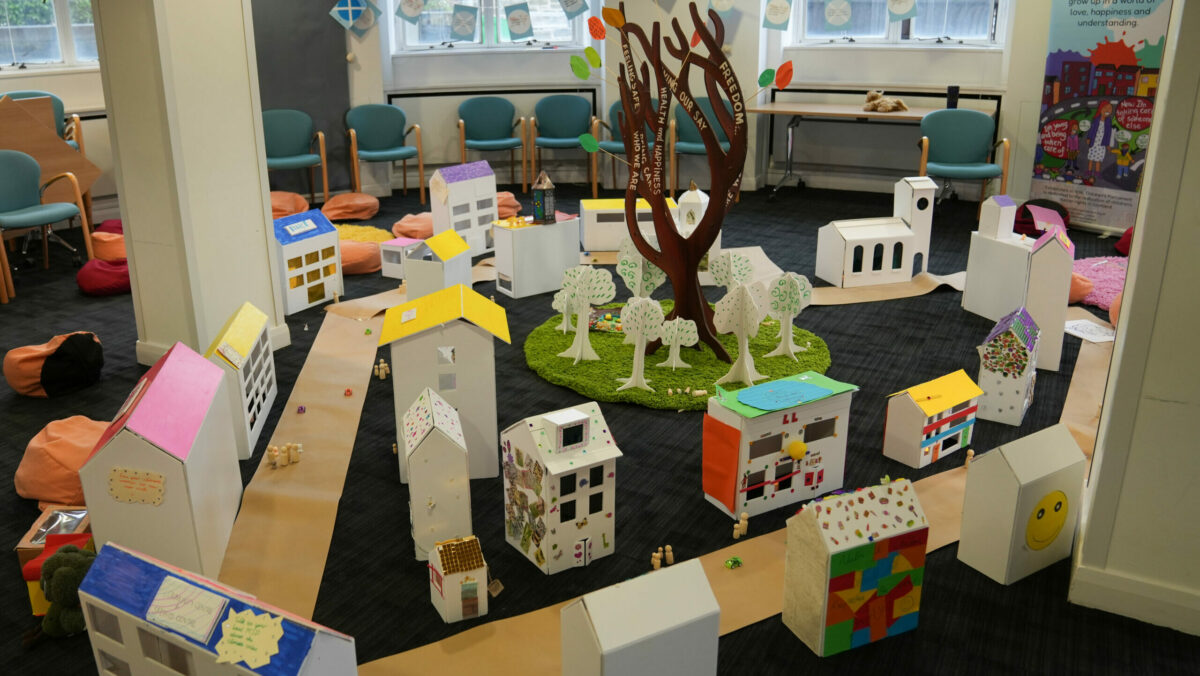At the Annual Children and Young People’s Executive Takeover 2024, Tom Schmoll MSYP and Beth MacKay MSYP gave a speech to the Permanent Secretary, Directors-General and other civil servants on investing in and protecting youth work services.
Looking back on the day, Tom and Beth said: “Executive Takeover gave us the chance to speak with some of the most influential people in government, and was an enormous opportunity to discuss issues which are important to us and young people across the country. We felt empowered not just as representatives, but as active contributors; and it will be exciting for all young people to see how the government protects youth work in future with their newfound conviction.”
You can read our speech below:
Today we are here to talk to you about the universal benefits of youth work services, and the dire situation they have been left in – and how we can invest in and protect youth work.
But first, what actually counts as youth work? To us, youth work is a way for young people to better develop skills, relationships, their identity and their confidence in a setting less formal than school. It includes everything from Scouts or guides, to after school clubs, to the Scottish Youth Parliament. It is a way for everyone to be more connected with their community, to meet new people and make friends for life. It’s an opportunity for young people to get involved and to feel supported by adults in a way that we often don’t otherwise experience. However, access is not equal. It varies depending on location and resource – this should not be happening when we know how much good it brings to young people’s lives.
By introducing this definition, our definition, into the discussion, we can develop our shared understanding of what youth work should look like, what makes it so important, and why it is a concern of the Scottish government – or should be.
We know that Youth work has the ability to change young people’s lives for the better but unfortunately today there are challenges which prevent access to these opportunities.
According to Unison’s 2019 report, ‘Youth services at breaking point’, youth work in the UK was butchered by cuts cumulating to over four hundred million pounds between 2010 and 2019. This is shocking! Youth workers across Scotland have indicated that services are underfunded and closing down.
These funding cuts are impacting young people across the country but speaking from the perspective of a young person in Aberdeenshire – they are particularly harmful to young people in rural areas. In rural areas where there is minimum transport, the ability to access youth work is dependent on parents or caregivers which does not give equal opportunity. Furthermore, in these rural areas many do not know of the opportunities that their communities have because there is no funding or resources to promote or support them.
Without appropriate prioritisation and protection from the Scottish government, youth work will not be able to provide, and it will not be able to continue. Using SYP’s own research, the ‘Youth Work & Me’ report (published in 2019 and 2023), when asked “what would happen if there was no youth work in your area?”, young people said that many may feel lonely without the friendships it brings. They said that their mental health would decline, and that depression would be ‘very prevalent’. They said that young people wouldn’t have the support that they ‘desperately need’. These projections of a grim future grow only more vivid as services continue to be cut. Another Unison report, published in 2016, detailed the fallout of cuts to youth work across the UK: seventy-seven per cent of respondents reported increased mental health issues among young people, while seventy per cent reported a rise in alcohol and substance abuse – figures both dwarfed by the eighty-three per cent of respondents who reported increasing instances of crime and anti-social behaviour.
Youth work is a critical preventative measure against anti-social behaviour, crime and mental health issues. Confronted with boredom and socioeconomic pressures these issues rise. And with mounting stress from schoolwork, personal issues, or family struggles, young people must be offered support – which can be done through youth work. CAMHS could see vital reductions in referrals. Overburdened police would not be required, as young people would have support from their youth workers. Schools could appreciate the production of well-rounded, open-minded students. Scotland’s young people would be able to realise their UNCRC right to a quality education that develops their personality, talents and abilities to the full.
On the flip side, when quality youth work is in place, it can revolutionise lives. One young person said to us that “[youth work] allowed me to grow as a person and feel valued – given me a chance to explore opportunities that I would never have dreamed of before”. Another said, “youth work is the reason I have more confidence and things like SYP have made me the person I am today – without it my life would look a lot different”.
Young people have made their feelings very clear. In fact, a survey of young people – conducted by YouthLink Scotland – asked them about the future of youth work. Any guesses on the % of young people who wanted to see youth work made a ‘right’ for everyone?
[The answer is 97%].
This brings us on to our calls to action. Given that cuts to services have occurred predominantly at a local level we present our first solution: the Scottish government must introduce youth work as a statutory duty for local authorities. By making this statute, youth work becomes a priority that must be fulfilled and adequately funded. Our young people deserve to have access to quality youth work services no matter what area they’re from or council they fall under.
We appreciate this might take time, so our second call to action is more immediate. Youth Work needs to be prioritised in budget decisions now, especially in the areas that need it most. Young people in rural Scotland for example need support to access these services. Part of this is effectively signposting what youth work services are already available to young people and ensuring consistency across the country, especially targeting rural areas and those that need it most.
Lastly, before any of this takes place, we want to have a real, youth-led roundtable with decision-makers, partners, charities and other young people. We want young people from across Scotland to not just respond to surveys or say that they want youth work to be made a right; but to have the opportunity to sit down face-to-face and talk about the impact of youth work with the people who decide where it sits as a priority. Young people need to be at the heart of shaping youth work for the future.
Youth work is more than just a sports team, a youth club, or a scouting troop. It is even more than a violence prevention unit or a counselling service. Youth work is a dynamic, ever-changing phenomenon that enriches young people and turns their lives around. Youth work is a tool, a preventative measure, not a plaster stuck onto a worsening issue. Youth work takes every facet of public contention and alleviates the pressure on government services. It is in the government’s interest. But youth work is being cut. And youth work is what you make it, so invest in it, cherish it, and protect it, because its importance to our nation can hardly be overstated, and never is.
Thank you!


